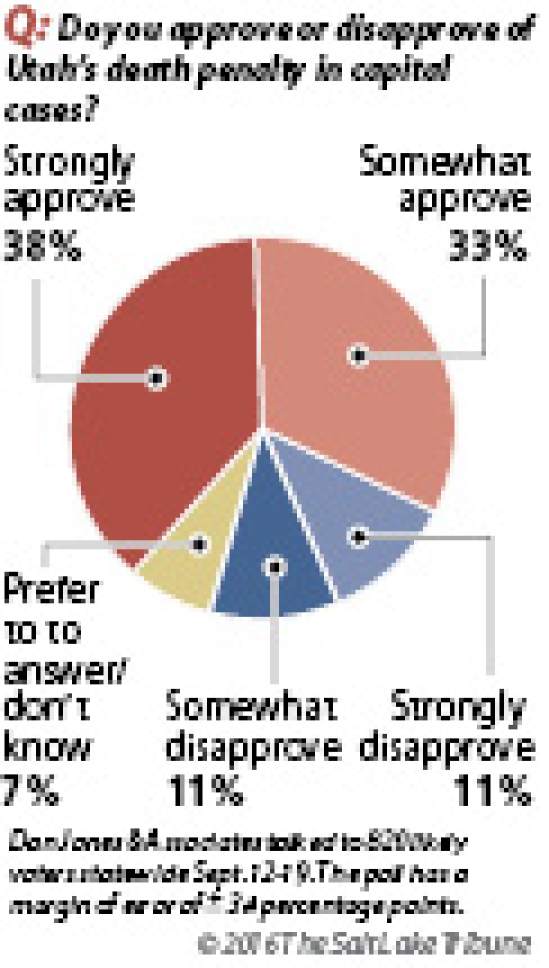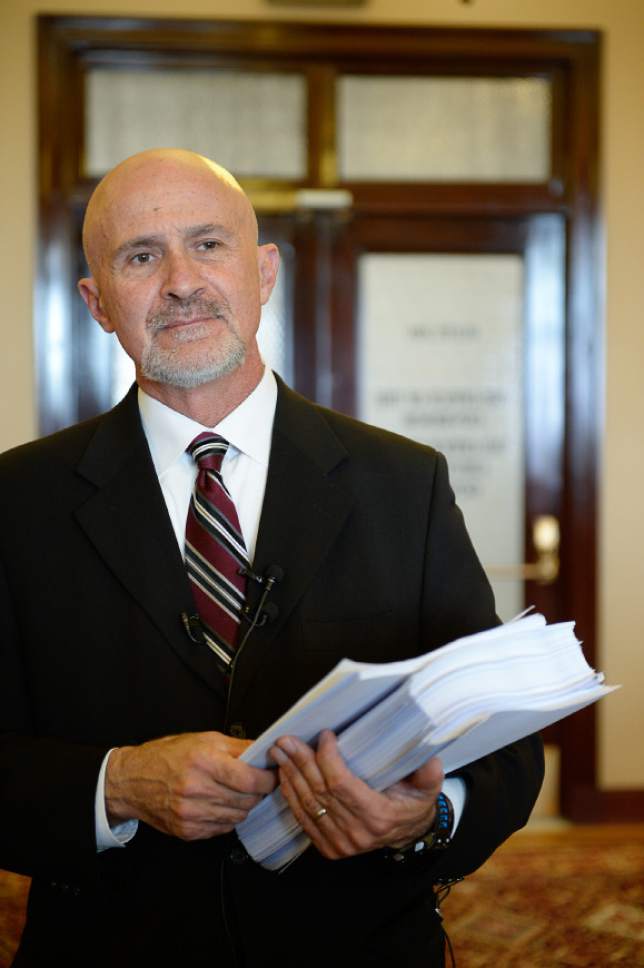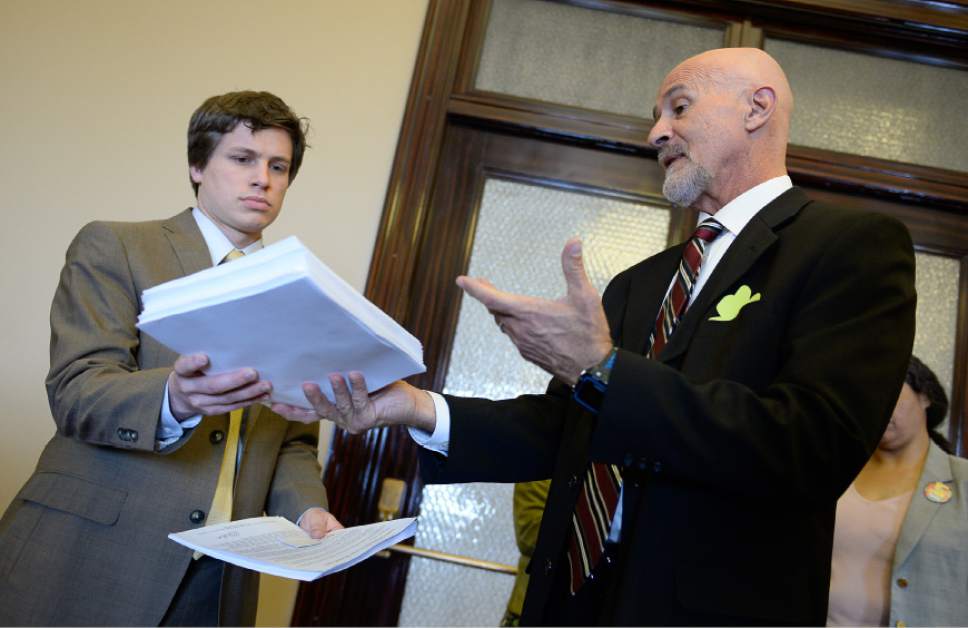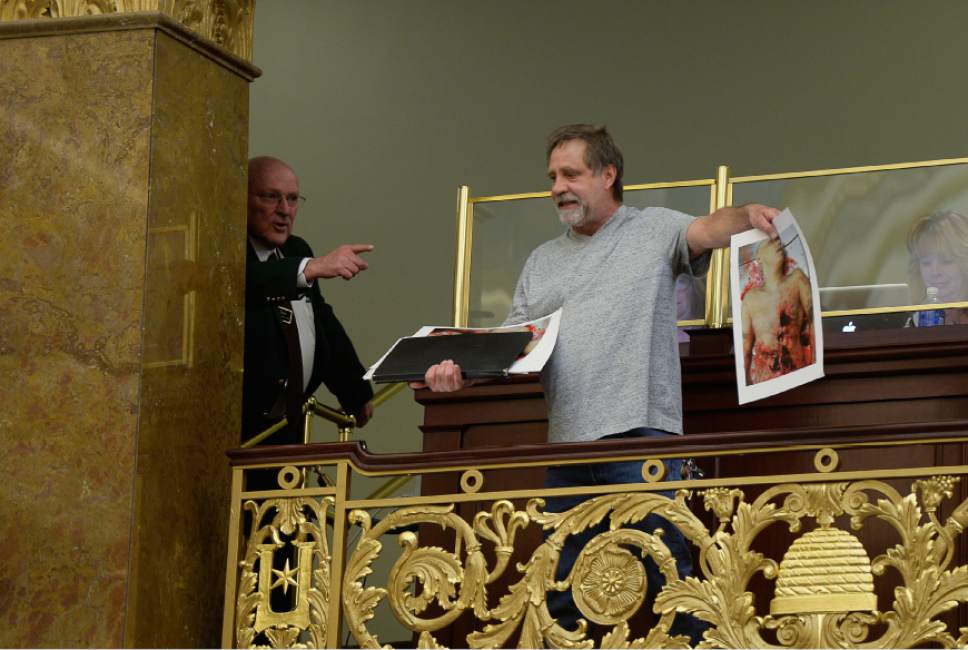This is an archived article that was published on sltrib.com in 2016, and information in the article may be outdated. It is provided only for personal research purposes and may not be reprinted.
Utahns still support capital punishment at a rate much higher than the nation as a whole, a new poll shows.
Some 71 percent of likely Utah voters say the state should continue to impose the death penalty in capital murder cases, according to the survey of conducted by Dan Jones & Associates for The Salt Lake Tribune and the Hinckley Institute of Politics at the University of Utah.
That's 10 points higher than the 61 percent of Americans who said they favor capital punishment in a national poll conducted last year by Gallup.
Nationwide, backing of the death penalty has been slipping since reaching an all-time high of 80 percent support in the 1990s. That hasn't been true in Utah, where conservative political and religious views have kept support high.
In the Dan Jones survey, 22 percent of respondents said they disapproved of capital punishment and another 7 percent either didn't respond or said they didn't know.
Support was higher among Utah men (75 percent) than women (67 percent), and highest among Republican respondents at 84 percent.
Democrats were more evenly divided — with 49 percent against the death penalty and 45 percent for it.
Capital punishment won backing among Utah's major religious groups — including 79 percent of active Mormons, 71 percent of Protestants and 54 percent of Catholics.
Conducted Sept. 12 to 19, the overall poll has a margin of error of plus or minus 3.4 percentage points.
Rep. Paul Ray, R-Clearfield, who has been the primary driver of pro-death penalty legislation on Utah's Capitol Hill, is not surprised by the results. They fit, he said, with what he hears from constituents even amid a national push to end the practice.
"A very large majority of people still support it," he said. "And the fact that we do it carefully [in Utah] and we don't have 45 people on death row shows that citizens have a comfort level with the way we do it."
Even so, Utah opponents say they are optimistic that the state eventually will end executions.
A bill to repeal capital punishment — as at least seven other states have done in recent years — cleared the Utah Senate earlier this year. While it failed to get a vote in the House, it got further than any expected.
"That tells me that, poll numbers aside, the people who are responsible for making our laws in the state are really beginning to rethink the death penalty," said Mark Moffat, a defense attorney who sits on Utah's Commission on Criminal and Juvenile Justice (CCJJ). "I think it's time we examine whether we, as a state, have it on the books."
Marina Lowe, of the American Civil Liberties Union of Utah, sees an appetite for that conversation. Lowe was among the advocates pushing lawmakers toward repeal.
An interim legislative committee and the CCJJ are examining the issue, she said, including looking closely at how prosecutors use capital-punishment laws, the appeals process and the legal costs Utah incurs in pursuing drawn-out capital cases.
The last person the state executed was Ronnie Lee Gardner in 2010, by firing squad. Eight of the nine men currently on death row were convicted of capital murder and sentenced to death before 1999. The last time a capital conviction was secured in a new case was in 2008.
Utah prosecutors bring capital charges more frequently than those numbers suggest. But, in nearly every instance, those cases resolve in ways that carry lesser sentences, including life in prison without the possibility of parole. That costs the state far less than capital cases, each which can run state and local governments an additional $1.6 million.
Sharing that kind of data with Utahns statewide is critical to advancing the conversation around repeal, said Ralph Dellapiana, a defense attorney who heads Utahns for Alternatives to the Death Penalty.
"People who don't know about the problems with the death penalty are unsurprisingly going to support it; it's the law," he said. "But the more people learn about it, the more they go, 'this is horrible.' "
Dellapiana said he and other advocates are working to renew a repeal effort during the 2017 Legislature, although they have yet to find a sponsor.











